Do you know that 39% of all chats between businesses and customers now involve a chatbot? It highlights AI chatbots’ role in customer communication, instant support, and lead generation.
So, if you want to avoid losing potential customers to slow response times and repetitive queries, chatbot marketing is the solution.
Chatbot marketing is revolutionizing customer engagement and driving conversions. Are you using this technology to the fullest?
In this digital age, where attention spans are short, users want quick, on-the-spot interactions. AI chatbots can help with this, and due to their advanced abilities, businesses are leveraging them in their marketing strategies.
This comprehensive guide will explore the fundamentals of chatbot marketing, best practices, and real-world examples. If you stick to the end, you’ll learn how to effectively use this technology in 2024 and increase your marketing efforts.
What are Chatbots?

Chatbots are automated computer programs that simulate human conversation via text or voice interactions. They use artificial intelligence (AI) to converse with humans to answer questions, provide information, and complete tasks.
In marketing, chatbots interact with customers, answer their questions in real-time, and even make sales.
There are two main types of chatbots:
Rule-based Chatbots: These chatbots follow rules to respond to user input. They are relatively simple to create but could improve their ability to understand and respond to complex queries.
AI-powered Chatbots: On the other hand, these chatbots use machine learning and natural language processing to understand and respond to user input naturally. They are more complex to create and can learn from their interactions with users and improve their responses over time.
AI-powered chatbots are used on various platforms, such as:
- SMS,
- Website chat interfaces,
- And social messaging services like Messenger and WhatsApp.
What is Chatbot Marketing?

Chatbot marketing is a digital strategy that uses chatbot technology to engage with existing or new customers via your specific app or website.
You allow your customers to ask for any information through chatbots anytime. Chatbot marketing effectively increases customer interaction and experience and generates more leads, sales, and conversions through upselling products based on specific rules.
These automated conversations help businesses enhance customer experiences, reduce response times, and increase efficiency.
For instance, you can deploy a chatbot to personally greet visitors to your website and answer their queries. This will give users the feeling of a tailored experience and quickly address their questions.
Key Components of Chatbot Marketing
To maximize the impact of chatbot marketing, it’s essential to develop a strong chatbot marketing strategy. It involves:
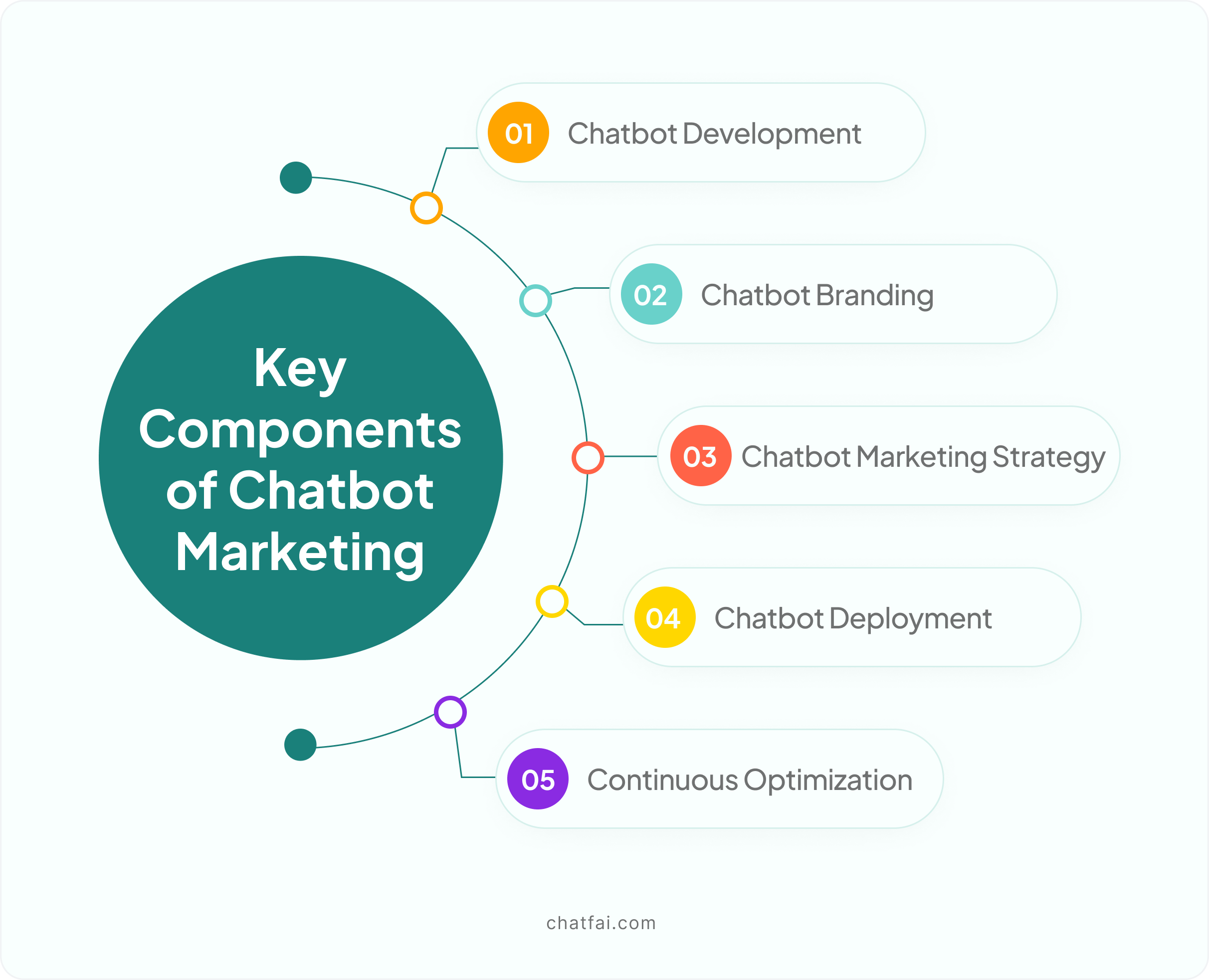
Development: Create a chatbot that aligns with your brand’s voice and goals. Properly train it to handle customer inquiries, provide product information, and guide users through the sales funnel.
Branding: Develop a distinct brand identity for your chatbot, including its name, personality, tone, and visual elements.
Marketing Strategy: Define clear objectives, target audience, and key performance indicators (KPIs) for your chatbot marketing efforts.
Deployment: Integrate your chatbot with various marketing channels, such as your website, social media, and messaging apps.
Continuous Optimization: Monitor your chatbot’s performance and analyze key metrics like engagement, conversion, and customer satisfaction. Gather user feedback and make necessary adjustments to improve its effectiveness.
Interesting Fact: 84% of companies believe AI chatbots will rapidly become essential to customer-business communications.
A practical implementation of chatbot marketing helps businesses unlock a powerful tool for improving customer satisfaction, increasing sales, and staying ahead of the competition.
Benefits of Chatbot Marketing
Chatbots have changed the way users interact with you and your business. They have automated every process, from user interactions to generating leads and sales.
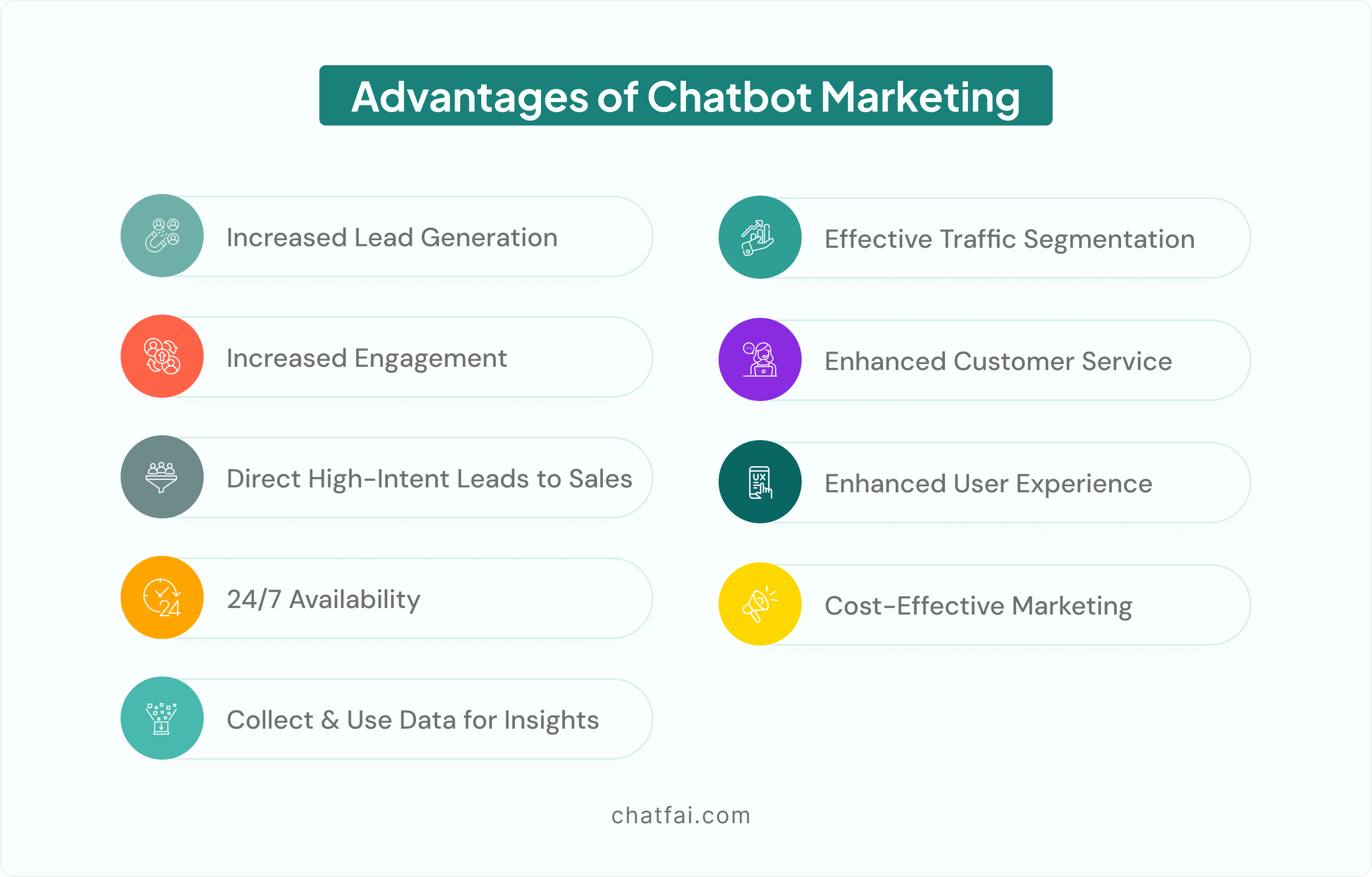
Here are some benefits or advantages of adding chatbots to your marketing strategy:
Increased Lead Generation
Almost 36% of businesses implement AI chatbots to increase their lead-generation strategies.
This robust technology can proactively engage and interact with your website visitors, qualifying leads 24/7 by asking targeted questions. This efficient lead qualification process helps identify high-intent leads and easily transfers them to the sales team to convert them into loyal customers.
Increased Engagement
Chatbots offer interactive and personalized experiences that captivate users. They welcome visitors with cordial prompts, provide instant answers, tailored recommendations, and playful interactions. It builds a deeper connection with the audience, keeping users engaged and encouraging them to return for more.
For instance, an AI chatbot might initiate a conversation by asking, “Hi there! How can I help you today?”
If a visitor expresses interest in a product or service, the chatbot could ask, “Could you please share your email address so I can send you more information?” This simple interaction allows businesses to capture valuable leads and convert them effectively.
Direct High-Intent Leads to Sales
AI chatbots can quickly signal the buyer intent of the specific visitors scrolling your product page and pricing categories. They then engage with them or directly route highly qualified leads to the sales team, streamlining the lead qualification process.
This sales cycle acceleration minimizes delayed responses and leads to faster conversions and increased revenue.
24/7 Availability

Another significant advantage of integrating chatbots into marketing strategy is that they can be available 24/7 and surpass human capabilities.
AI chatbots are tireless workers, always available to assist customers, regardless of time zones or holidays. Unlike human agents, they don’t require breaks or time off, ensuring consistent customer support around the clock.
This continuous availability can significantly enhance customer satisfaction and brand reputation and build customer loyalty.
Collect Data & Use It for Insights
Chatbots are data-gathering machines. They collect valuable insights into visitors’ names, contact information, preferences, behaviors, and pain points. You can use this rich data to analyze and refine your marketing strategies, improve product offerings, and enhance overall customer experiences.
Effective Traffic Segmentation
Chatbots can segment traffic based on various criteria, such as demographics, interests, or purchase history. It enables businesses to deliver highly targeted messages and offers and maximizes the impact of marketing campaigns.
Enhanced Customer Service
Chatbots can handle many customer inquiries, from simple questions to complex issues. By automating routine tasks, chatbots free human agents to focus on more strategic and challenging tasks. It improves response times, reduces customer wait times, and elevates overall customer satisfaction.
Enhanced User Experience
Chatbots provide a smooth and convenient user experience. They can help users find information quickly, complete tasks efficiently, and resolve issues promptly. This soft and to-the-point experience leaves a positive impression on customers, increasing brand loyalty and trust.
Cost-Effective Marketing
Chatbots are a cost-effective marketing solution. They can automate many routine tasks by utilizing lead qualification tools. This reduces labor costs and increases operational efficiency. It also allows businesses to allocate resources to more strategic initiatives and drive better ROI.
How to Use Chatbots in Marketing
Chatbots can be used to automate a variety of tasks, from simple customer queries to complex sales processes.
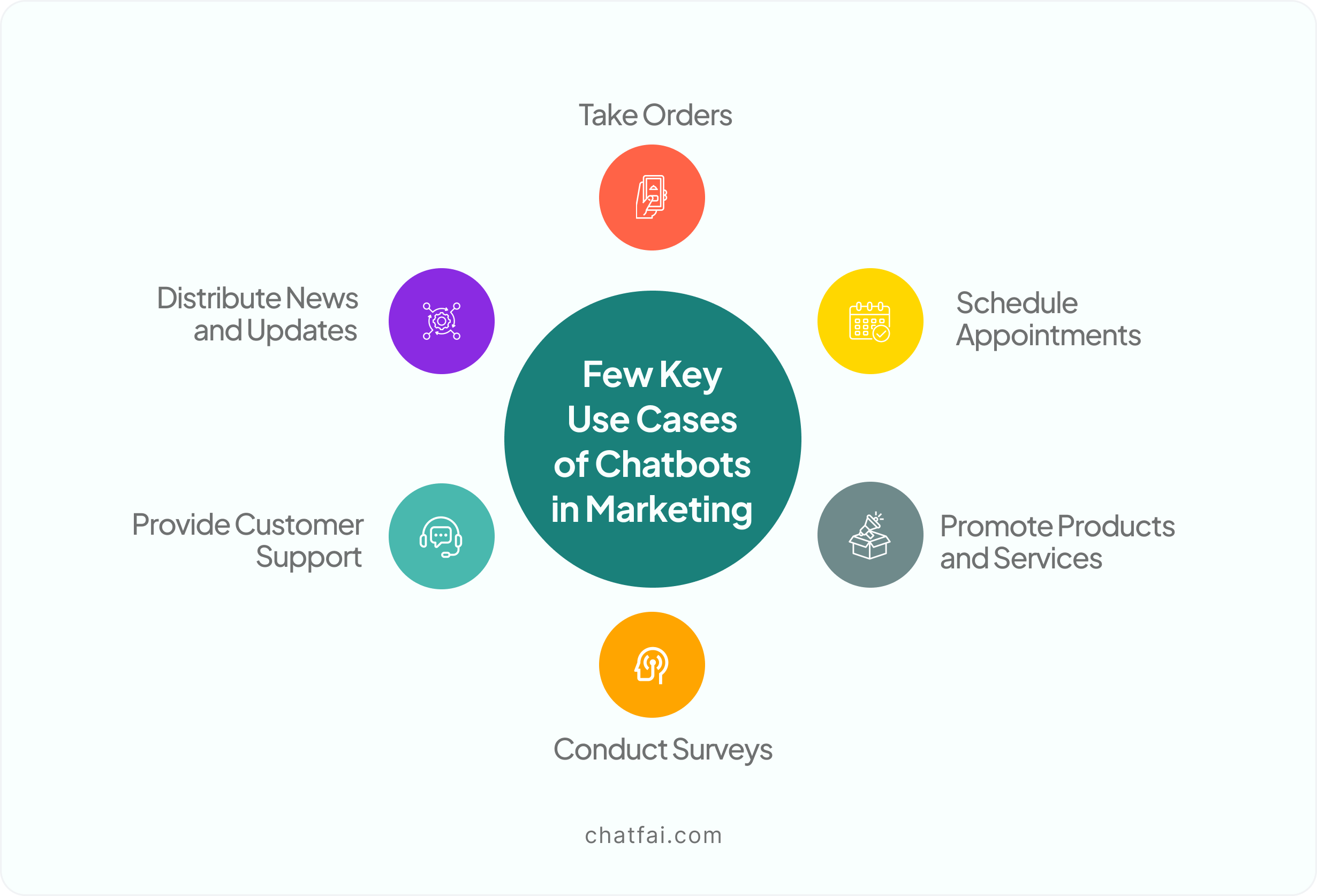
Here are a few critical use cases:
Taking Orders
Chatbots can simplify ordering by guiding customers through product selections, handling payments, and providing real-time order updates. It can lead to increased sales and improved customer satisfaction.
For instance, a food delivery service can use a chatbot to allow customers to browse menus, customize orders, and track delivery status.
Scheduling Appointments
Chatbots can efficiently schedule appointments by asking customers for availability, suggesting suitable time slots, and sending automated appointment reminders. It saves time for both businesses and customers.
A healthcare provider, for example, can use a chatbot to book appointments, send reminders, and answer patient questions.
Promoting Products and Services
Chatbots can proactively promote products and services by sending personalized offers, answering product inquiries, and providing recommendations based on customer preferences.
For instance, an e-commerce store can use a chatbot to suggest products based on browsing history, offer discounts, and answer customer questions about products and shipping.
Distributing News and Updates
Chatbots can inform customers by sharing the latest news, updates, and announcements. It helps build brand awareness and customer loyalty. A news website can use a chatbot to provide breaking news updates, weather alerts, and personalized news feeds.
Providing Customer Support
Chatbots can handle various customer inquiries, such as troubleshooting common issues, answering FAQs, and providing product information. It can reduce the workload on customer support teams and improve response times.
For example, a tech company can use a chatbot to provide technical support, answer product questions, and troubleshoot common issues.
Conducting Surveys and Gathering Feedback
Chatbots can conveniently and efficiently conduct surveys and gather feedback from customers. This valuable customer insight can be used to improve products, services, and the overall customer experience.
Chatbot Marketing Examples
AI chatbots have revolutionized the way businesses and brands interact with their customers. They have made things a lot easier and made each interaction more personalized and on the spot. Here are some real-world examples of businesses using AI chatbots to craft marketing strategies successfully:
Mindvalley’s Personalized Learning Recommendations
Mindvalley, a personal development platform, employs a chatbot on its Facebook Messenger to guide visitors through its various offerings. The chatbot also provides personalized learning recommendations based on users’ interests and goals.
Moreover, the chatbot helps users discover relevant courses and programs, enhancing their learning experience. This highly targeted approach personalizes the learning journey, increases user engagement, and drives course enrollments.
LEGO’s Interactive Gift Guide

LEGO introduced its chatbot during the holiday session to help visitors pick the right gift for their loved ones. The chatbot transformed the traditional gift-buying experience into an interactive and personalized journey.
The AI chatbot asked thoughtful questions about the recipient’s age, interests, and budget. It then narrowed the vast array of LEGO products to a curated selection. Moreover, it also included links to local stores or online purchase options, making the shopping experience easier and more enjoyable.
It simplified shoppers’ decision-making process and increased their likelihood of selecting the perfect gift. By offering a fun and engaging shopping experience, LEGO’s chatbot helped boost sales and enhance customer satisfaction.
Roma by Rochi’s Fashion-Forward Bot
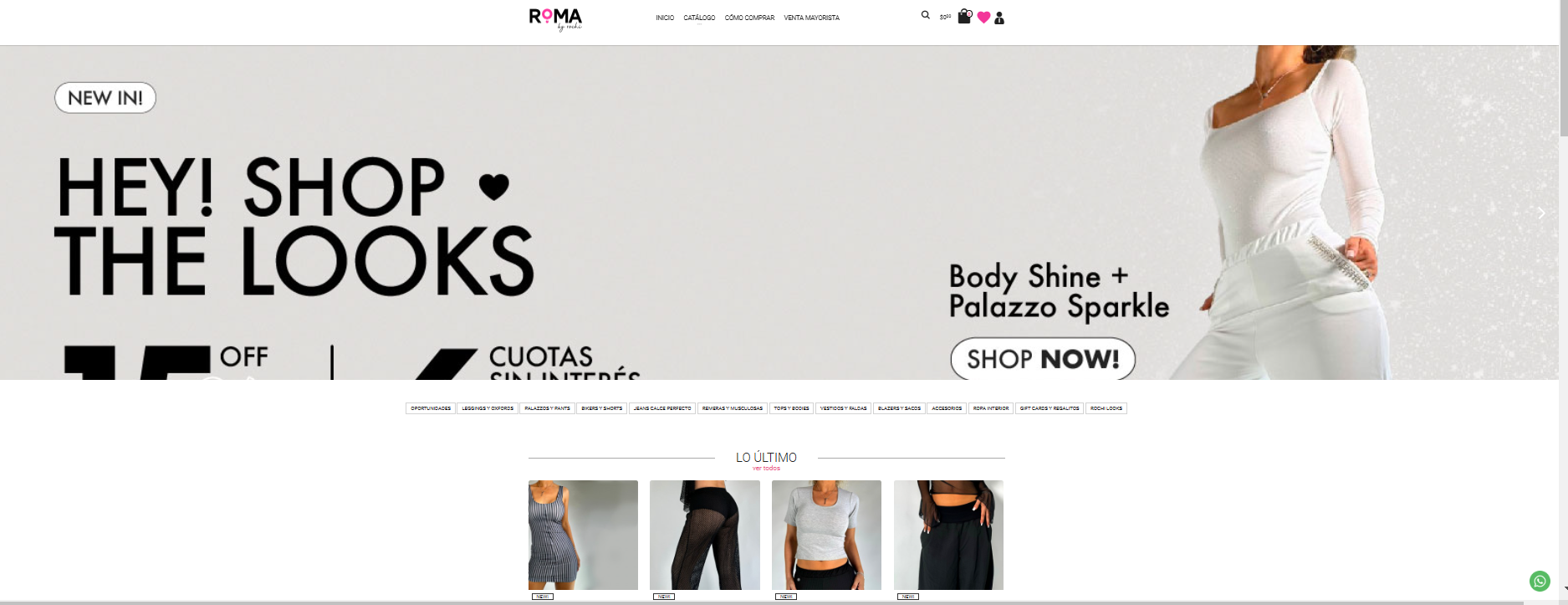
Roma by Rochi, an e-commerce fashion brand, uses a chatbot to offer personalized shopping experiences and styling advice. The chatbot analyzes customers’ preferences, body types, and occasions and suggests tailored outfit recommendations.
This personalized approach enhances customer engagement and experience and drives conversions by guiding users directly to the products they’re interested in or sales and promotions.
Moreover, the chatbot can answer questions about sizes, materials, and care instructions and provide real-time updates.
H&M’s Interactive Product Finder
H&M’s chatbot helps customers find perfect products by asking questions about desired styles, colors, and preferred sizes, entering a keyword, or uploading photos. Based on this information, the chatbot effectively narrows the vast product catalog and directs customers to the right product page.
This interactive approach saves customers time and increases the likelihood of finding items that align with their unique tastes. Overall, H&M’s AI chatbot provides a convenient and efficient shopping journey, ultimately improving user experience and driving more sales.
Kaysun Corporation’s B2B Engagement
Kaysun Corporation, a B2B company, uses a chatbot to engage with potential clients and answer their inquiries immediately. The chatbot provides product information, addresses concerns, provides service details, and schedules meetings, leading to more efficient lead generation and customer acquisition.
1-800-Flowers’ Direct Ordering

1-800-Flowers is known as an early adopter of AI chatbots in marketing. The 1-800-Flowers chatbot increases the flower-ordering experience by guiding customers to select flowers easily and providing a smooth ordering process.
The chatbot allows customers to order flowers and gifts directly through a simple conversation. This streamlined ordering process improves customer experience and provides on-time assistance on high-demand days like Mother’s Day, birthdays, Thanksgiving, and Valentine’s Day.
Tips for an Effective Chatbot Marketing Strategy
To maximize the impact of your chatbot marketing strategy, consider these essential tips:
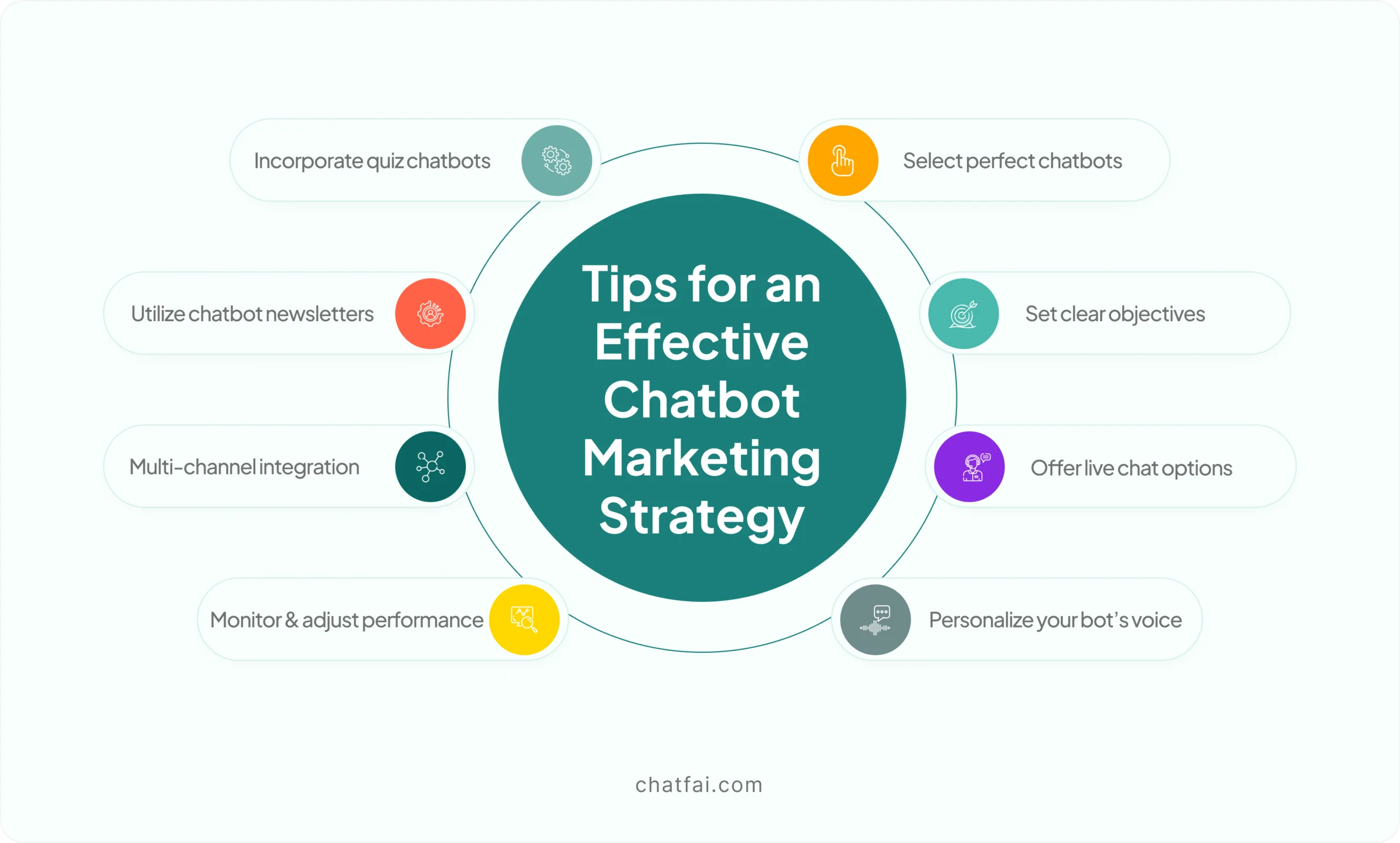
Things to Avoid in Chatbot Marketing
While chatbots can be a powerful tool, avoiding common pitfalls is essential to ensure a positive user experience.
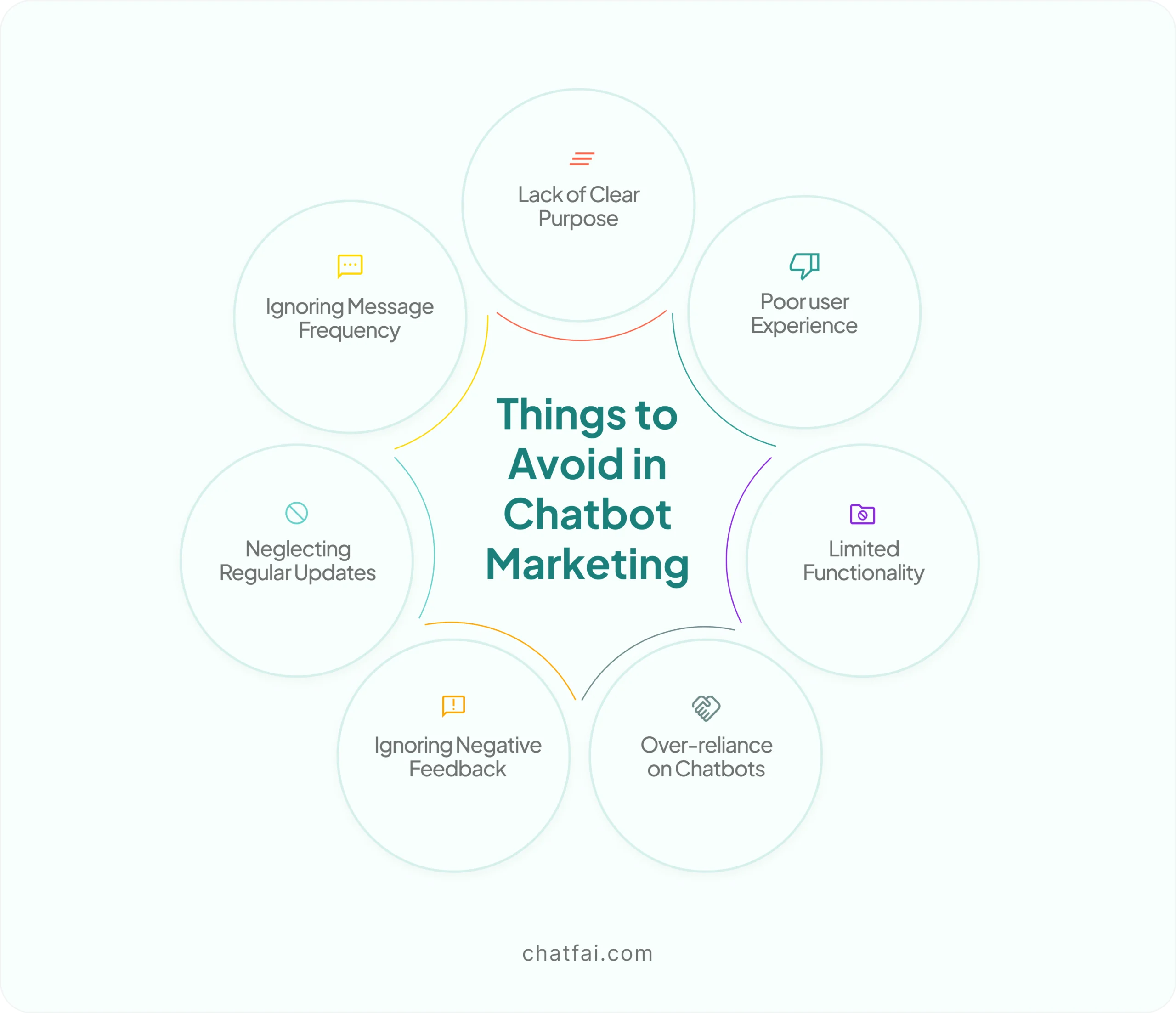
ChatFAI – A Tool To Create AI Characters You Like the Most
ChatFAI is a powerful AI tool that allows you to create engaging and interactive chatbots or AI characters. These characters could be fictional or from the real world around you.
From any movie character to an AI character with your friend or girlfriend traits, you have vast options to have an AI companion right at your side.
And isn’t it amazing if I tell you that you can also create an AI character with all the marketing knowledge with the help of ChatFAI? Yes, you read it right.
Now, with ChatFAI, you can create an AI chatbot to suggest innovative marketing ideas and provide instant support and solutions to grow your business online.
Here’s a guide to know everything about ChatFAI.
So, your next question is, how can I create an AI character on this fantastic tool with all the marketing knowledge?
Well, here is how you can do that.
Generating AI Marketing Character Using ChatFAI
Step 1
Go to the ChatFAI website and sign up by providing the necessary information to create your account.
Step 2
After that, this interface will appear, and you can chat with your favorite character.
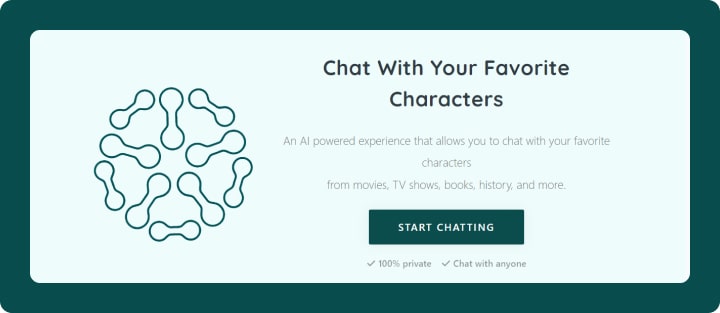
Step 3
Now, here comes the actual game. Click on “New Character” to create an AI character with all the latest marketing information, and it can help you make top-notch strategies.
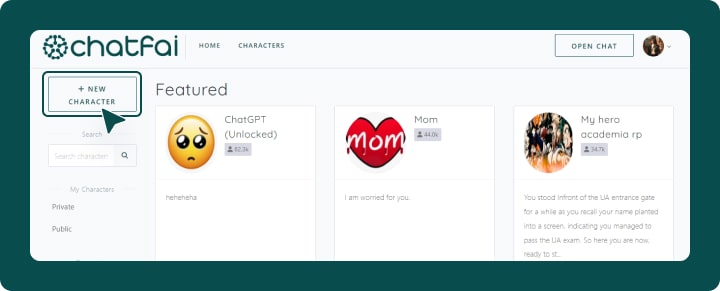
Step 4
Fill in all the details of your AI character/chatbot, like name, brief bio/description, and display picture. Define the chatbot’s tone and voice, whether formal, informal, humorous, or profound.
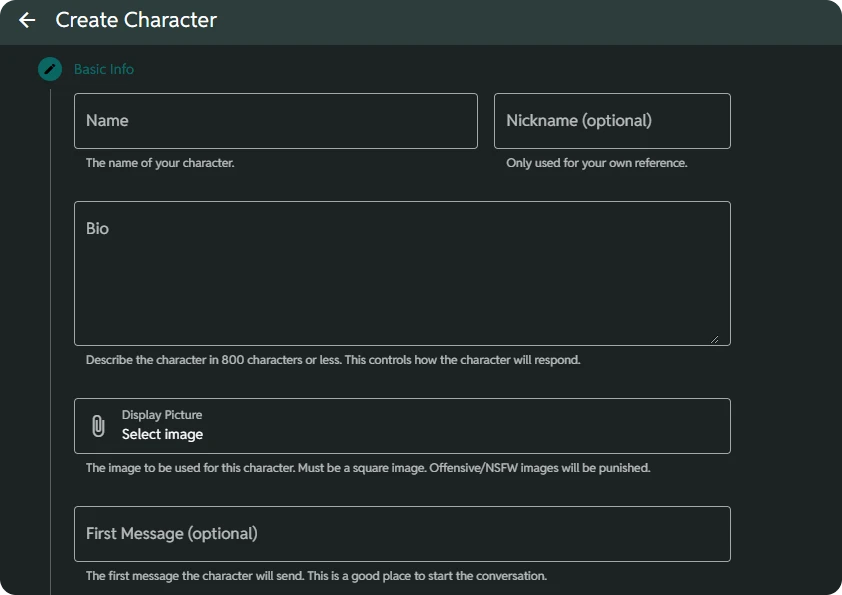
Set its visibility, click on save, and click “Add character.”

And it’s done.

Your AI companion is here to assist you in all your marketing campaigns. Ask anything that comes to your mind, take its advice, and implement it for your next marketing campaign.
Here are some more incredible ChatFAI use cases.
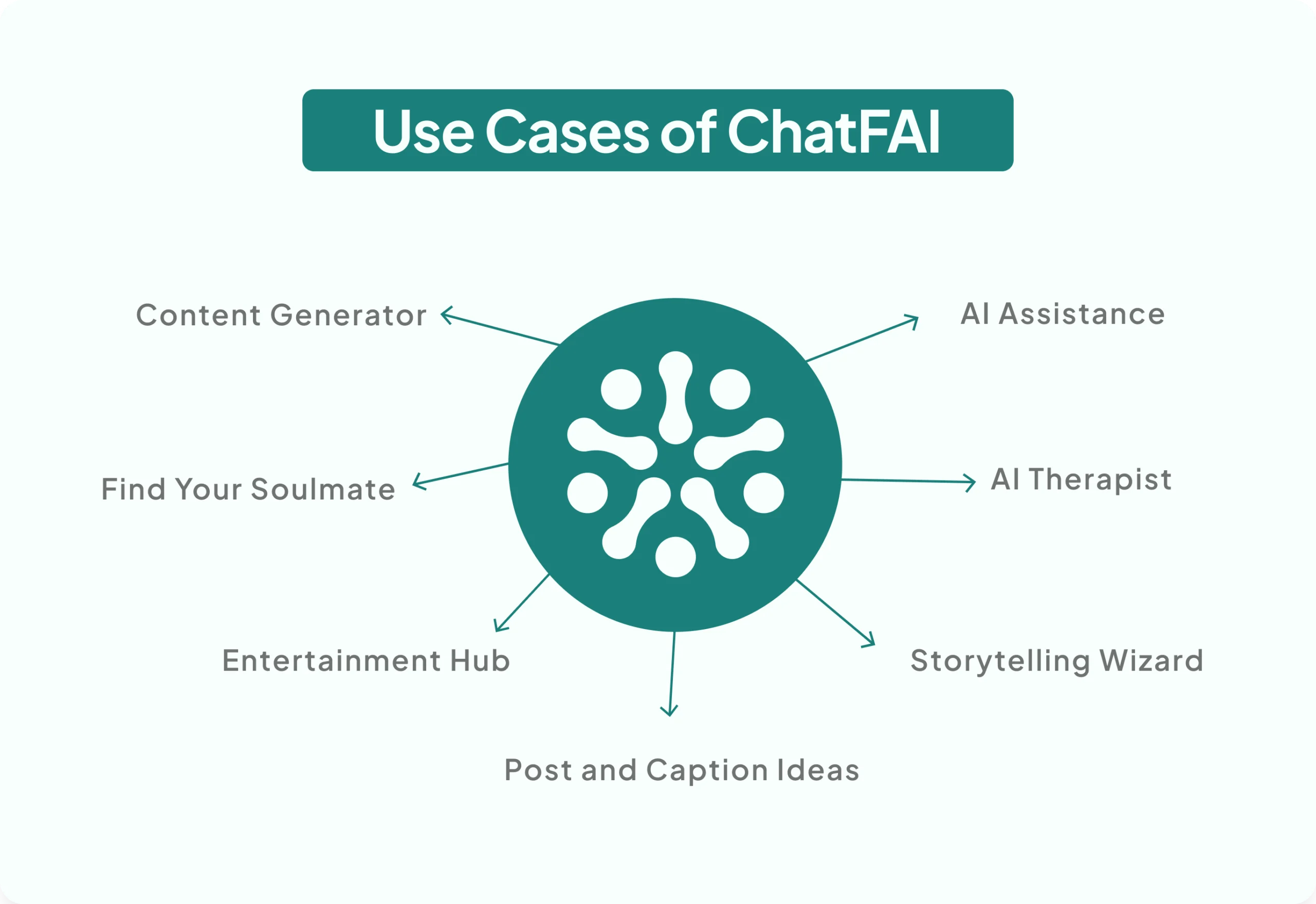
Wrap UP!
Today, chatbot marketing has become a powerful tool for businesses and brands. They use AI chatbots to increase customer engagement, simplify operations, and drive growth.
Chatbots in marketing can do more than humans. They can automate interactions, provide personalized experiences, and offer 24/7 support. Chatbots are revolutionizing the way businesses communicate with their customers.
As we move forward, it’s crucial to stay updated on the latest advancements in chatbot technology and explore innovative ways to use it to achieve business objectives.
So, ready to elevate your marketing strategy with the power of chatbots? Let us know in the comments below!
FAQs
What are Examples of Chatbots in Marketing?
Chatbots have become increasingly popular in marketing, offering a variety of applications. Here are some examples:
- Customer Service Chatbots: Answer frequently asked questions, provide product information, and troubleshoot issues.
- Sales Chatbots: Can guide customers through the sales process, answer questions about products or services, and even close deals.
- Marketing Chatbots: Engage with potential customers, collect leads, and promote products or services.
- Lead Generation Chatbots: Qualify leads by asking questions about their needs and interests.
Which Chatbot is Best for Marketing?
The best chatbot for marketing depends on your specific needs and budget. Some popular options include:
What is AI Bot Marketing?
AI bot marketing uses AI-powered chatbots to automate marketing tasks and improve customer engagement. AI-powered chatbots can understand and respond to natural language, making them more effective at interacting with customers.